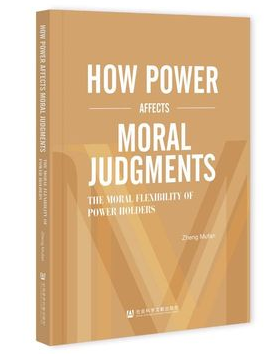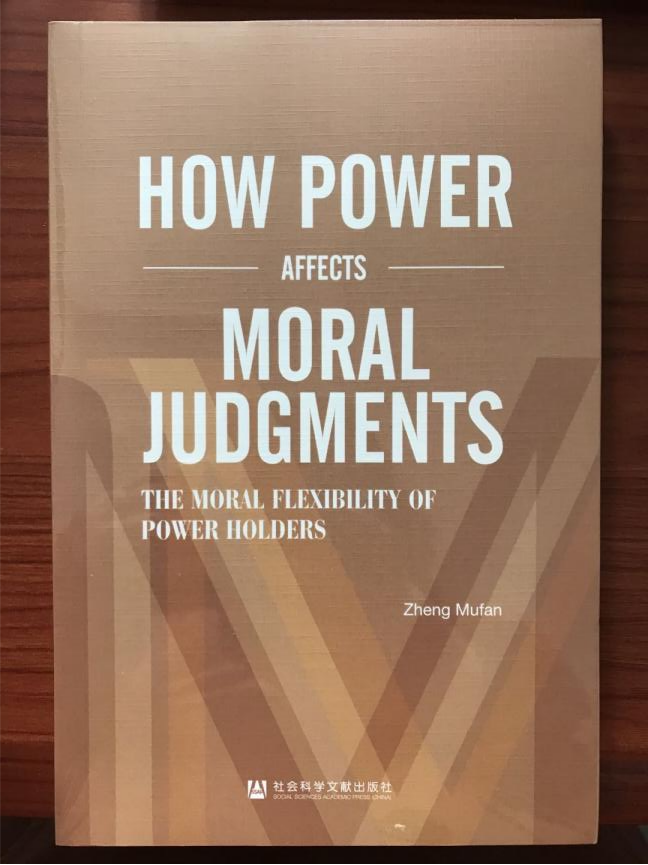【社科文献出版社】郑睦凡著作:《How Power Affects Moral Judgments?: The Moral Flexibility of Powerholders》
点击次数: 更新时间:2021-10-20

书名:《How Power Affects Moral Judgments?: The Moral Flexibility of Powerholders》
作者:郑睦凡
出版社:社科文献出版社
出版年:2021
内容简介
权力被定义为个体拥有的能够通过给予或收回资源与实施惩罚来改变他人状态的能力。由于拥有权力者掌控资源,同时拥有与公众利益密切相关的决策权,长期以来,社会科学家和公众对权力如何影响道德这一问题十分关注。本书围绕“权力如何影响道德决策”这一主题进行了深入的研究和探讨。全书首先回顾和总结了过往学者关于权力与道德决策的理论与实证研究,并在此基础上提出权力影响道德决策的理论机制,之后通过十个实证研究详细探索和论证了权力与道德决策间的关系,并探讨了认知风格、目标导向等因素在其中的机制作用。
作者认为,在通常情况下,权力会促使人们去做出更偏向于道义论的道德选择。这是由于直觉加工偏好所导致的。尽管如此,权力在道德推理上所表现出的差异更多依赖于当前目标。权力促使个体将注意力集中于当下的主要目标,例如与组织文化相关的目标,这可能引起高权力个体情境特异性的道德决策和跨情境的道德灵活性。权力与道德推理的关系是灵活的,具有情境敏感性。相比于低权力个体,高权力个体拥有一种目标导向型的道德思维。
作者简介
郑睦凡,女,1992年生人,现任武汉大学心理学系讲师。2019年毕业于英国伦敦大学学院(University College London)心理学系,获博士学位。2019年10月起任教于武汉大学心理学系。作者主要研究方向为社会心理学,主要从事权力、道德领域的实证研究,擅长心理学实验的研究方法。曾在国内外学术刊物上发表多篇相关主题论文,并主持一项国家社会科学基金项目。
Preface
I became interested in the relationship between power and morality from 2011. For long time, power was considered to be related to decreased morality. People can often read news about corruption of power holders. Things are similar in academic area. From 1970s, there was increasing concern about how power changes people’s mind and morality. Much evidence shows that increased power leads to immorality, such asincivility and selfish behaviour. However, I noticed that in daily life people possessing power often hold very different opinions towards the same event from those without power. I wondered if some cognitive activities and behaviours related to moral issues that was considered as corruption of power holders was eventually due to the inherent tendencies led by power. Then, I started to read papers related to power and morality, among which I found the research about the relationship between power and moral judgments of Lammers. I was awareof my interest inthis topic.
Power holders control social resources and hold the right to make decisions involving the public, but few studies focus on how power affects neutral moral thinking style. Research on how power affects moral judgments could provide an answer for a longstanding quest for the understanding of the links between power and morality, andfacilitates the practice in organisations.
The workof this book demonstrated that the powerful and the powerless show a distinctive pattern of moral judgments. Power holders were found to rely on deontology to make moral judgments and maintain the current rules, and people lacking power were found to be more practical and useutilitarianism to make judgment. This was confirmed by cross-culture studies and invarious contexts (e.g. lab and organisational environments). Compared to previous studies, thepresentfindings contribute to establish the ecological validity andthegeneralizability of the links between power and moral reasoning. Besides these, the study offered several parallel explanations for how power affects moral judgments: cognitive processing style, goal focus, goal commitment and the desire for authority maintenance.
The findings in this book help understand how power affects the mind. Power-as-control theory, power approach/inhibition theoryand the situated theory of power, as classical thoriesabout power, depicted the outline of power from different facets. However, few studiesdirectly investigated the role of cognitive processing style, the motivation of authority maintenance andgoal focus in moral activities of power holders,especially about the choice in the conflict between deontology and utilitarianism. This book provides supports for these theories in moral domain. More importantly, the current work proposes that the powerful treat the choices of moral principles as a strategy to serve their goals; moral judgments of power holders are amenable to the influence of active goals.In other words, power holders possessaflexible moral value.
The presentresearch belongs to social psychology research; therefore, I also wish that these findings shall contribute to social life. From my point of view, this book mightprovide insights for the decision makers in organisations and the political area in the following ways.Firstly, differences in the perspectives of powerful and powerless individuals cancreate organisational or societal conflict. Knowledge of the epistemological viewpoints triggered by hierarchy can be useful to manage those conflicts. Also, the current work indicates thatpower holders show deontological preferences accompanied by intuitive effortless processes, unless the context calls for deliberation. This may lead to no fully consideration about the benefits of all sides. Thus, organisationscanset up regulations to keep the persons in the authority position have deliberative processes before important decisions. Finally, the goal focus orientation of power holders guides their moral judgments. This orientation may lead to short sightedness of the powerful. People with power and authority may over focus on the current context, goals, tasks at hand, and ignore benefitsfor most people whom they cannot see and thelong-termoutcomes. This finding cautions people who are in high power positions to balance the current task and long-term goals.
Contents
Chapter 1 Introduction / 1
1.1 Power / 4
1.1.1 What is Power? / 7
1.1.2 Methods and Measures in Power Research / 17
1.1.3 Theories of Power / 23
1.1.4 Consequences of Power / 32
1.1.5 Power and Morality / 44
1.1.6 Summary and Outlook / 47
1.2 Moral Judgments / 49
1.2.1 Deontology and Utilitarianism / 50
1.2.2 Moral Dilemmas / 54
1.2.3 Intuitionist and Rationalist Model / 59
1.2.4 Influencing Factors in Moral Judgments / 68
1.2.5 Summary and Outlook / 74
1.3 Power and Moral Judgments / 76
1.3.1 Aims of the Current Studies / 78
1.3.2 Power and Moral Judgments in Different Contexts / 79
1.3.3 The Role of Cognitive Processing Style / 82
1.3.4 The Role of Goal Focus / 83
1.3.5 Summary and Outlook / 87
1.4 Present Research / 89
1.4.1 Is the Association Between Power and Moral Judgments Generalisable? / 90
1.4.2 How Does the Presence of Harm Modify the Association Between Power and Moral Thinking Style? / 91
1.4.3 What Is the Role of Processing Style on the Links Between Power and Moral Judgments? / 93
1.4.4 Understanding the Link Between Power and Moral Judgments With the Situated Theory of Power–the Role of Goals Focus / 95
Chapter 2 The Replications And Extensions Of Previous Findings About Power And Moral Judgments / 98
2.1 Replication of Previous Findings / 98
2.1.1 Overview / 98
2.1.2 Study 1: Replication Study of Lammers and Stapel (2009) / 99
2.1.3 Study 2: Power and Moral Judgments in an Organisational Environment / 107
2.1.4 Summary and Outlook / 115
2.2 How Harm Modifies the Association Between Power and Moral Thinking Style / 116
2.2.1 Overviews / 116
2.2.2 Study 3: Moral Reasoning in the Presence of Harm / 121
2.2.3 Study 4: Moral Reasoning in the Presence of Impersonal Harm / 135
2.2.4 Summary and Outlook / 143
Chapter 3 Power, Cognitive Processing Style and Moral Judgments / 146
3.1 Overview / 146
3.2 Study 5: Cognitive Load Increases the Preference for Deontology of the Powerless / 149
3.3 Study 6: Deliberative Thinking Increases Utilitarian Judgments Among the Powerful / 157
3.4 Summary and Outlook / 162
Chapter 4 Power Increases Moral Flexibility Via Focal Goal Commitment / 165
4.1 Overviews / 165
4.2 Study 7: Goal Focus Modifies How Power Affects Moral Judgments / 169
4.3 Study 8: How Power Affects Moral Judgments with Personal Chronic Goals? / 177
4.4 Study 9: Power Increases Deontological Judgments via the Chronic Goal of Maintaining Authority / 183
4.5 Study 10: The Mediating Role of Goal Commitment / 199
4.6 Summary and Outlook / 214
Chapter 5 General Discussion / 218
5.1 Overview / 218
5.2 Summary of the Present Research / 218
5.2.1 Replication / 218
5.2.2 How Harm Modifies the Association Between Power and Moral Judgments / 219
5.2.3 Power, Cognitive Processing Style and Moral Judgments / 220
5.2.4 Power Increases Moral Flexibility via Goal Focus / 222
5.2.5 Experimental Design / 227
5.2.6 Effect Size / 228
5.3 Implications of the Present Findings / 234
5.3.1 Power and Moral Thinking Style / 235
5.3.2 Theories and Research of Power / 238
5.3.3 Theories of Moral Judgments / 240
5.3.4 Applied Implications / 241
5.4 Limitations / 243
5.4.1 Boundary Conditions for Power
Differences in Moral Judgments / 243
5.4.2 Further Study About the Role of Cognitive Processing Style / 244
5.4.3 Goal Focus / 245
5.4.4 The Utilitarian Judgments of the Powerless / 246
5.4.5 Manipulation of Power / 246
5.5 Conclusion / 247

